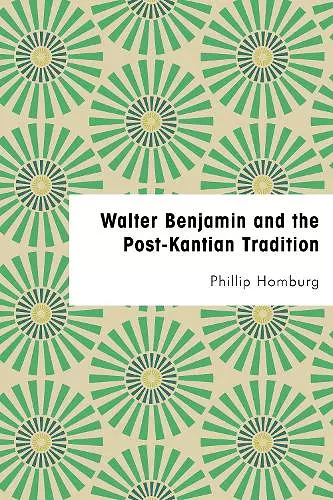Walter Benjamin and the Post-Kantian Tradition
Format:Hardback
Publisher:Rowman & Littlefield International
Published:15th Nov '18
Currently unavailable, and unfortunately no date known when it will be back
This hardback is available in another edition too:
- Paperback£35.00(9781786603838)

Walter Benjamin and the Post-Kantian Tradition engages with Benjamin as a theorist of a historical and philosophical problematic of modernity: a problematic that he finds manifested, in different philosophical guises, within scientific empiricism, neo-Kantianism and German Romanticism. The book takes us through these manifestations systematically and, in doing so, it demonstrates how Benjamin develops a unique form of materialist criticism from within the tension he locates within transcendent neo-Kantianism materialism and the immanent standpoints of scientific materialism and German Romanticism.
In Walter Benjamin and the Post-Kantian Tradition, Homburg offers a unique intervention regarding Benjamin’s epistemology. Additionally, Homburg offers a detailed, nuanced, and clear account of the intellectual linkage between the Neo-Kantians and Benjamin. For those who are interested in learning more about post-Kantian era epistemology and the ways in which it can be applied to modernity, this book is a must-read. -- Jameliah Shorter-Bourhanou, Assistant Professor of Philosophy, Georgia College and State University
Phillip Homburg’s Walter Benjamin and the Post-Kantian Tradition is a close reading of Benjamin’s early thought that interprets Benjamin’s critiques of both Romanticism and neo-Kantianism as critiques of modernity itself. Homburg demonstrates that Benjamin is equally unconvinced by both the Romantic solution, and the neo-Kantian solution, to the longing for totality at work in the objectivity that modern philosophy presumes. -- Tina Botts, Assistant Professor of Philosophy, California State University, Fresno
Benjamin's relationship to then pervasive influence of Neo-Kantian thought has not been carefully explored in English language scholarship. Phillip Homburg addresses this need with both nuance and an eye for historical detail. He carefully delineates the thought of the now mostly forgotten Neo-Kantians before concluding with a discussion of the much better known German Romantics. In so doing, he recreates the fervor of ideas out of which Benjamin's remarkable thought emerged. This is an important historical study that enriches our sense of Benjamin and his world. -- Jason Wirth, Professor of Philosophy, Seattle University
Through clear and detailed exposition of key philosophical texts spanning the century from Kant and Hamann to Heinrich Rickert and Hermann Cohen, Homburg brings to light the full extent of Benjamin’s debt to—and transcendence of—the Neokantian tradition in which he was educated. -- Howard Eiland, Lecturer, Literature Faculty, Massachusetts Institute of Technology
Speaking directly to modern minds torn between scientific, reductionistic accounts of material existence and those abstract ideals contesting them, Homburg offers a major re-examination of Benjamin’s materialist notion of the idea. He deftly addresses historical arguments that divided post-Kantian philosophies, particularly in their neo-Kantian and Romantic forms, all while significantly and richly illuminating a rarely examined influence upon Benjamin’s early writings on experience. -- Colby Dickinson, Associate Professor of Theology, Loyola University Chicago
ISBN: 9781786603821
Dimensions: 231mm x 159mm x 18mm
Weight: 431g
170 pages